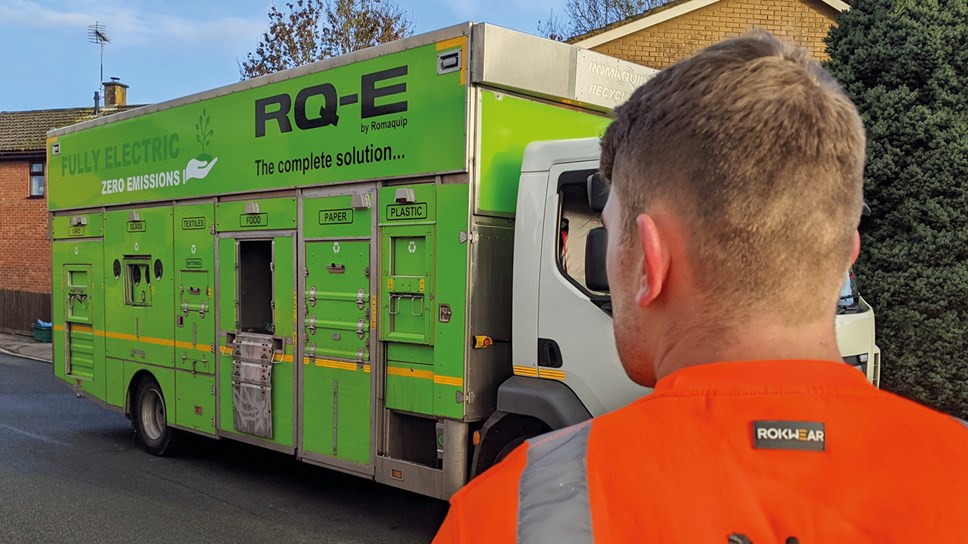
Electric vehicle trial sparks question about future waste collections
Householders listening out for the familiar sound of their recycling lorry may have been surprised by the quietness of their recent collections as the Forest of Dean District Council trials a fully electric vehicle - a first for the district.
The try-out of the RQ-E Kerb-Sort Romaquip could lead to even cleaner, greener household waste collections in the future.
Transport linked to the waste, recycling and street cleansing services is by far the largest emitter of emissions linked to the Council’s operational activities. Significantly reducing the amount of CO2 is pivotal to the authority achieving its ambitious target of becoming net zero by 2030.
With a range of 150 miles on a single charge and zero tailpipe emissions, the 16 tonne battery powered Romaquip vehicle was put through its paces by the Council’s waste contractor Biffa. Over 5 days crews completed recycling rounds to judge the driving experience, ease of loading and how well the vehicle performed in tackling the Dean’s rural geography.
Councillor Andy Moore, Cabinet Member responsible for waste and recycling at Forest of Dean District Council, said: “Our waste and recycling vehicles are reaching the end of their working life. We’re now exploring what’s on the market to replace them while achieving the highest environmental benefits. The latest advances in electric vehicle technology, particularly in terms of heavy fleet vehicles, are opening up more options for local authorities looking for sustainable solutions to how they deliver services to residents. We have seen some really promising results from the trial. The feedback will help us move ahead with our vehicle procurement strategy and support our work to make further improvements to the recycling service.”
In 2021-22 the Council’s waste fleet created 850 tonnes of CO2e and travelled over half a million miles.
Councillor Chris McFarling, Cabinet Member for Climate Emergency at the Council said: “At over 80 per cent, the biggest contribution to the Council’s emissions is created by the waste, recycling and street cleansing vehicles. Moving to zero and/or low emission vehicles will be a huge step in cutting the greenhouse gases produced by our activities and key to us reaching net zero by 2030, ahead of the government’s target. It will also result in less air pollution and a healthier environment for our residents.”
Requiring greater upfront investment, electric vehicles benefit from lower maintenance and day-to-day running costs and are cheaper to run when compared to their diesel counterparts.
At November’s Cabinet councillors agreed to set aside £1.9m of capital spend to procure new waste vehicles and requested work be brought forward on the Council’s vehicle fleet decarbonisation strategy. The recommendation will now be considered at next month’s Full Council meeting.
The District Council currently owns 14 diesel-powered Romaquip vehicles. The vehicles were first introduced in 2016 when cardboard and plastic bottles were added to the range of materials collected at the kerbside for recycling.
The configuration of the Romaquip body allows crews to load different materials into separate compartments on the vehicle. Keeping materials apart maintains the quality of what is collected so items can be recycled efficiently, ensuring higher-grade materials are put back into the recycling process to be made into new products and packaging. Selling higher-grade recycling supports the Council’s recycling services with the income received being invested back into the services provided to residents.
Contact Information
Forest of Dean Communications Team
Notes to editors
- In 2021-22 the Council’s vehicles (operated by Biffa) produced 850,172 kg CO2e.
- 84% of Forest of Dean District Council emissions which are under the Council’s direct influence - classed as scope 1 and 2 emissions - are the result of transport emissions from its fleet of vehicles, the majority of which relate to its waste and recycling service.
